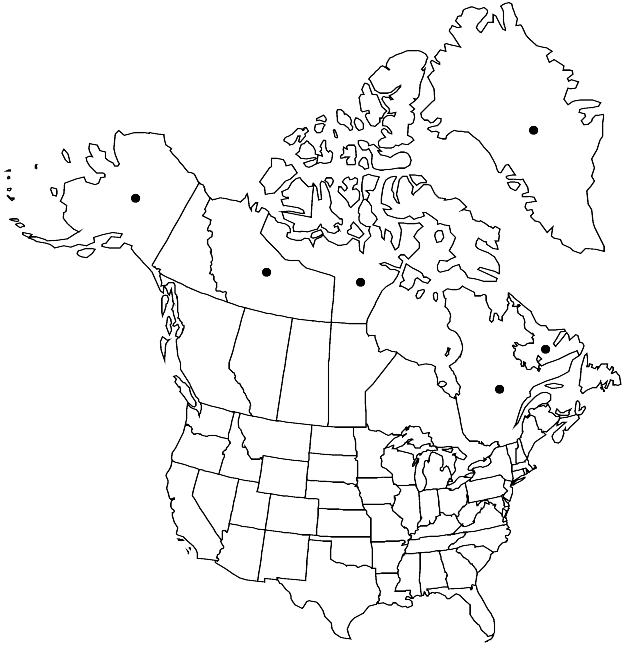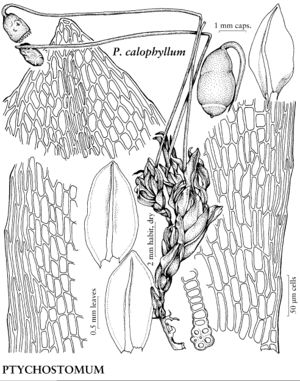Ptychostomum calophyllum
Phytologia 87: 20. 2005.
Plants in dense or open turfs, green, yellow-green, or brown. Stems 1–3 cm, fertile stems comose, innovations evenly foliate. Leaves yellow-green to yellowbrown, somewhat distant, weakly contorted to somewhat imbricate when dry, broadly ovate, concave or sometimes flat, 0.5–2.5 (–3) mm, enlarged toward stem apex; base red near costa, green otherwise, not decurrent; margins usually plane, limbidium moderately strong, in (1–) 2–3 rows; apex obtuse to broadly acute; costa not reaching apex to percurrent, apiculus sometimes present, short, blunt; proximal laminal cells long-rectangular, (3–) 4–5: 1; medial cells somewhat longer, walls incrassate; distal cells 12–25 µm wide, 2–3: 1, walls incrassate. Specialized asexual reproduction absent. Sexual condition autoicous. Seta redbrown, 2–4 cm, stout, straight to somewhat flexuose. Capsule yellowbrown, ovate, symmetric, 2–3 mm, mouth yellow to yellow-orange; hypophysis thick; operculum short-conic, apiculate; peristome reduced; exostome teeth red to redbrown or yellowbrown basally, hyaline distally, lamellae curved mid-tooth, pores absent or rarely a few present at base of teeth; endostome not adherent to exostome, basal membrane less than 1/2 exostome height, segments with lanceolate to slitlike perforations, cilia absent or rudimentary. Spores with size often variable in same capsule, (28–) 30–40 µm, yellow or brown.
Phenology: Capsules mature Jul–Aug.
Habitat: Moist gravelly to sandy soil, near sea, along streams, around lakes
Elevation: low to moderate elevations (0-1000 m)
Distribution

Greenland, Nfld. and Labr. (Labr.), N.W.T., Nunavut, Que., Alaska, n Eurasia
Discussion
Ptychostomum calophyllum is a distinctive species with a short, ovate capsule, ovate leaves with a blunt apex, and a strong limbidium. Sterile material from alpine regions of Colorado matches arctic material and may belong here. This is a variable species with several segregates synonymized under P. calophyllum by D. T. Holyoak (2004). Although part of the analysis by Holyoak is accepted here, P. acutiforme seems quite distinct and is therefore retained in this treatment. The three segregates reported from the flora area, based on the work of E. Nyholm (1986+, fasc. 3), are discussed below. The variation, ecology, and distribution of these species is poorly understood; capsules are needed for identification.
Characters that segregate Ptychostomum calophyllum are short-ovate capsules yellow-brown to brown when mature, and neck thick. Ptychostomum acutiforme and P. axel-blyttii are distinguished by capsules red when mature, short-ovate, neck thick, or short-pyriform with neck slender. Of these, P. axel-blyttii has leaves of fertile stems broadly ovate, apices ± obtuse, concave, margins entire, and capsules short-pyriform, neck slender, while P. acutiforme has leaves of fertile stems ovate-lanceolate, apices acute, flat, margins denticulate, capsules short-ovate, and neck thick. Ptychostomum axel-blyttii is known only from Greenland.
Selected References
None.
Lower Taxa
"narrower" is not a number."narrow" is not a number.
